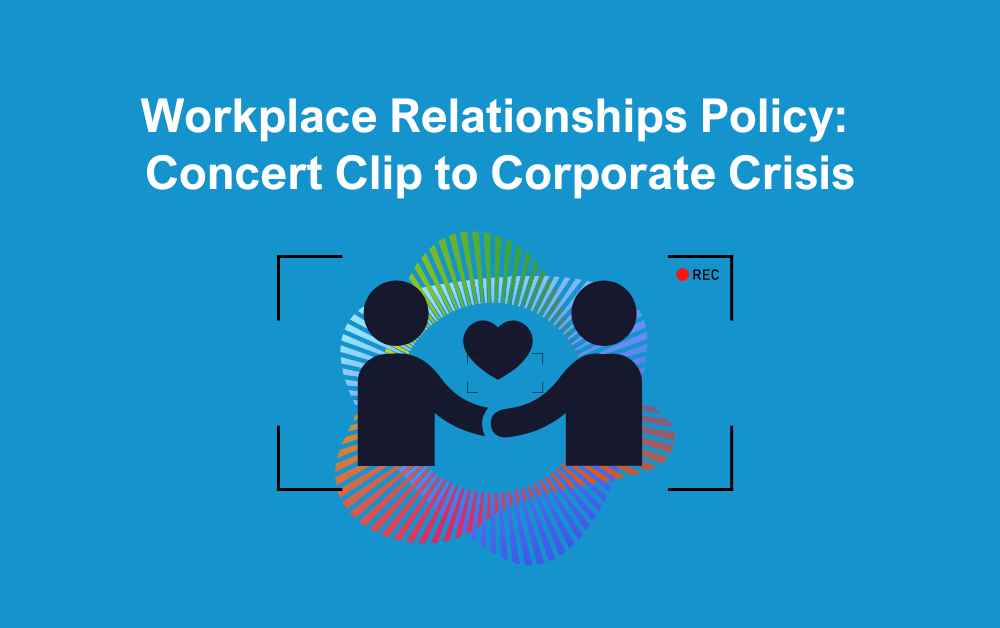The recent resignation of Astronomer’s CEO after being caught on a stadium kiss-cam with the company’s Chief People Officer has reignited debate over professional boundaries at work. While some dismissed it as a personal matter, the fallout—including both executives stepping down—proves otherwise. Without clear expectations in place, personal relationships can quickly become corporate risks. That’s where a well-drafted workplace relationships policy becomes essential. Not just to manage romantic relationships, but to protect the organisation’s culture, reputation and legal standing.
What Happened and Why It Matters
In July 2025, the CEO of US-based data company Astronomer became the centre of an unexpected public relations storm after he was filmed embracing the firm’s Chief People Officer on a kiss-cam during a Coldplay concert. The moment, projected to thousands in the stadium and later shared online, quickly went viral—raising questions not just about personal boundaries, but professional ones too.
Within days, both executives were placed on administrative leave pending an internal investigation. Soon after, they both resigned from their positions.
While the interaction may have appeared harmless to some, its implications for leadership credibility, company reputation, and HR governance were significant. This is where a workplace relationships policy would have been helpful. When senior leaders engage in personal relationships—particularly without formal disclosure or clear boundaries—it can lead to perceptions of favouritism, conflicts of interest, and serious organisational disruption.
The Risks of Workplace Relationships
While workplace relationships aren’t inherently problematic, they can create serious challenges when boundaries become blurred—especially when one or both people are in senior leadership positions. The Astronomer case highlights how quickly a private relationship can become a public and professional issue.
Here are some of the common risks employers face:
-
Power Imbalance and Favouritism
When one person in the relationship holds authority over the other, it can lead to real or perceived favouritism. This can damage team morale, create divisions, and open the door to claims of unfair treatment or discrimination. -
Conflicts of Interest
If a relationship involves someone in HR or leadership, it becomes harder to manage sensitive matters objectively. This can undermine internal processes and erode trust in leadership. -
Reputational Damage
As seen in the Astronomer case, even relationships outside the office can affect a company’s public image. In today’s world, a viral clip or social media moment can result in real business consequences. Therefore, a wokplace relationships policy is essential. -
Legal and Compliance Risks
In some cases, romantic relationships at work can trigger claims of harassment, coercion or a hostile work environment—particularly if the relationship ends badly or wasn’t disclosed appropriately. -
Impact on Team Culture
Gossip, discomfort, and speculation can distract from day-to-day work. Employees may question the integrity of decisions, promotions, or performance reviews, especially if transparency is lacking. This can negatively impact company culture.
These risks aren’t just theoretical. They’re real issues that can harm company culture, erode team trust, and in extreme cases, lead to resignations or legal disputes. That’s why a clear, practical workplace relationships policy is a must-have—not a nice-to-have.
What Is a Workplace Relationships Policy?
- What happens after disclosure (e.g. adjustments to reporting structures)
Why This Should Be on Your HR Agenda Now
The Astronomer scandal shows how quickly a private moment can turn into a public crisis. Two senior leaders were forced to resign after a personal interaction outside work became viral—highlighting just how unprepared many businesses are when workplace relationships blur professional lines.
A clear workplace relationships policy helps set expectations, protect against reputational damage, and support fair treatment across the organisation. It’s not about policing employees’ personal lives—it’s about avoiding conflict, safeguarding culture, and ensuring leadership accountability.
Addressing this now means your organisation won’t be left scrambling when issues arise. The message is simple: set the boundaries before they’re tested.
Final Thoughts: It’s Not About Policing – It’s About Protecting
This scandal has been an important reminder for businesses to address personal relationships in the workplace. The best way to do this is through a Workplace Relationships Policy. While your policy will act as a protective, proactive measure, it’s important to remember its not a ban on human connection. The best way forward is to encourage openness and trust rather than secrecy. This avoids any issue in the future and ensures you and your managers are ready to act if lines are crossed.
Contact Us
If you are dealing with a similar situation in your business or would like help to create a Workplace Relationships Policy, our Consultants are here to help. Contact us today.







